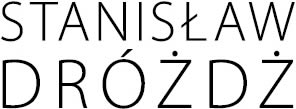

AUTHOR | WORK
Numerical Texts, Tadeusz Sławek
[…]
Voice is not able to perform the numerical texts by Stanisław Dróżdż as it is impossible to read enormous sequences of digits which they consist of. We are unable to do it as, for one thing, we do not know if these digits are a part or the entirety of any number and, secondly, even if we knew that, we would not have enough imagination to read the entire number. The voice is a sonic wave of imagination, whereas the numbers by Dróżdż go beyond imagination. Even those which can be read out in their mathematical formula are inconceivable, and so we read something which exists beyond and independently of us and has no connection with us.
Those which have been recorded by means of single digits could be read out but then what would be carried by our voice would not be a message of any value but a self-demonstration: our voice would not announce any number but only separate digits taken out of their context. We still would not have any ‘whole’ beyond our voice: our voice would take delight in itself. Voice proves to be helpless while approaching numerical texts by Dróżdż: it may only read them out without any understanding. It may articulate them, separate their single fragments and this is what it should end with. Even while reading these texts out we would have to obey to rules of writing: movement after movement, digit after digit. The language is rusted with writing. The digits by Dróżdż make this process visible as they are an implicit gesture of writing.
The digits by Dróżdż are the image of a certain infinity for several obvious reasons. Their sequences may run towards infinity just as their ordered listing. The digits do not end and although their system limited by 0 and 9 is closed, the syntagm composed of these digits is an endless text.
[…]
Therefore we understand better now why Dróżdż applied numbers in his works. They introduce him into a super-imaginary realm which is tantamount to placing him beyond death. Someone who uses numbers, as he did, knows that we will die on reciting a subsequent digit of the string but the number composed of these digits will remain infinite. The way the author approached numbers bears much resemblance to Borghesian fascination with enigmas. Przypadek x [Case x] is like a fragment of the name of God which will never be formed as a whole within the time of our human lives. […]
Compared to Arthur Clark, when the computer computed all the possible combinations of letters which constituted the name of God, the stars and suns began to switch off. Endless chaos and infinite order are the flip sides of the same fact: an impossibility of obtaining further information.
A excerpt of an essay Gesture and the Suffering. Numerical Texts by Stanisław Dróżdż, [in:] Tadeusz Sławek, In-Between Letters, Wydawnictwo Dolnośląskie, Wrocław 1989.